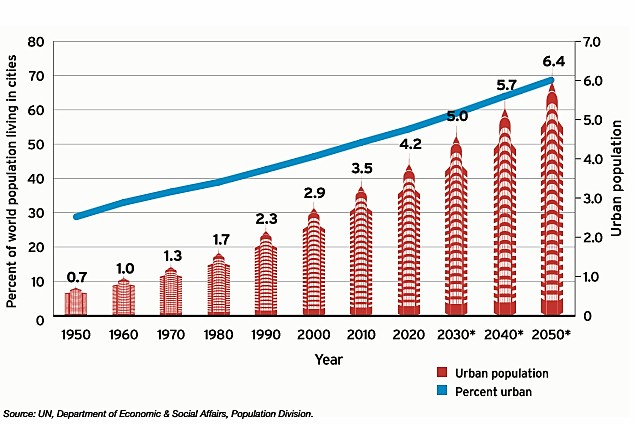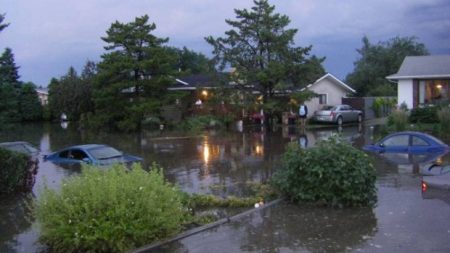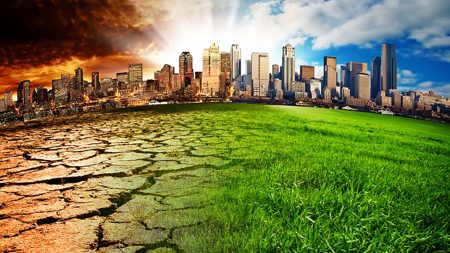March 10, 2018 – Some 750 city leaders, policymakers, and world scientists gathered in Edmonton, the heart of oil sands country, over three days this week to look at the impact of climate change on cities and chart a course for mitigation and adaptation urban policies and projects. Joining them were 6,000 more in 30 countries following the discussions online.
The conference, entitled The Cities IPCC Climate Change Science Conference, debated about current knowledge related to the role cities play in global warming. The end result of the discussions included a charter for academic, practitioner and policy-making focusing on:
- Improving evidence-based information and data modeling at the city level
- Exploring trade-offs and synergies of climate change mitigation and adaptation
- Looking at nature-based solutions
- Developing a funding and financial strategy that incorporates the role of banks, insurance companies, and developers
“The impacts of climate change are already being felt in our urban areas, and the next few years are critical for determining how effectively we will rise to the challenge of protecting our cities. However, we can’t undertake this work blindly” stated Seth Schultz, Director of Science and Innovation at the C40 Climate Leadership Group. He went on, “this research won’t just help save our cities, it will also improve them for generations to come.”
The conference was organized by the Intergovernmental Panel on Climate Change (IPCC) along with nine partners including C40 Cities, Cities Alliance, Future Earth, ICLEI, the Sustainable Development Solutions Network, United Cities and Local Governments, the United Nations Environment Programme, UN-Habitat, and the World Climate Research Programme.
Hosted by Edmonton and its mayor, Don Iveson, it seems to be a peculiar place to be tackling the issue of global warming and climate change with Fort McMurray and the oil sands a mere few hundred kilometers away, and networks of oil pipelines within immediate proximity. But Iveson is a progressive leader in a province that is still struggling to define its future in light of the controversy over the oil sands and their contribution to Canada’s carbon emissions.
“Business-as-usual will not save the world,” stated Debra Roberts, Co-Chair of the IPCC Working Group II. She went further, “This conference disrupted the traditional story of the world’s cities to show how science can partner with policy and practice to transform the world’s cities into climate-smart, equitable and sustainable homes for all.”
How much do cities contribute to global warming?
In the last century, humans have become city dwellers. The correlation between this migration and the rise in greenhouse gases cannot be dismissed. With most economic activity in cities and their suburbs cities are consuming as much as 80% of all the energy produced worldwide, and contribute almost the equivalent in greenhouse gas emissions. By 2050 the problem will become even more acute as migration to urban areas continues with the expectation that 70% by then will be city dwellers.

Shobhakar Dhakal, from the Asian Institute of Technology, stated, “With the contributions of cities and the risks to cities in the context of climate change loud and clear, solution-oriented knowledge is a must.” That means the need to come up with city solutions to greenhouse gas emissions.
Stated Anne-Helene Prieur-Richard, Montreal Global Hub Director of Future Earth, “We can only create real transformative changes in cities through research focusing on issues of equity, power distribution, integration of values, and human behaviour.”
The conference focused on four major themes:
- Cities and Climate Change – discussions covered global commitments to COP21, the Paris Climate Agreement, Sustainable Development and explored methods for achieving its goals through implementing sustainable development plans, climate mitigation and adaptation with the imperative to develop actions yielding a low-carbon, climate-resilient, sustainable urban future.
- Urban Emissions, Impacts, and Vulnerabilities – discussed current and future urban emission drivers, urban climate impacts, and climate risks and vulnerabilities with the goal to develop science-based pathways for cities to pursue emissions reductions and resilience strategies.
- Solutions for the Transition to Low Carbon and Climate Resilient Cities – explored the transformative nature of cutting-edge sustainable development strategies including discussions about disruptive technology, urban infrastructure and design, and institutional innovation.
- Enabling Transformative Climate Action in Cities – looked at city climate action within the context of diverse social, environmental, economic, and developmental realities, addressing poverty, inequality, the reshaping of power relations, and re-conceptualizing of what cities are, could be, and should be.
The results from the conference will contribute to the IPCC’s ongoing Sixth Assessment Report (AR6), which is scheduled for completion in 2022, as well as contribute to an IPCC report on cities and the new urban agenda for sustainable development.
Why Edmonton as the Host City for a Climate Conference
The choice of Edmonton as the venue for this event was clearly a statement in support of using science to create good policy to tackle global climate change. The city stated Mayor Iveson has already seen the impacts of severe weather events that were uncommon in the past, spending hundreds of millions of dollars on infrastructure to deal with flooding. He also talked about the wildfires that struck neighbouring Fort McMurray and pointed out that there is a cost to inaction and physical facts are proving the case.

Edmonton is in the process of instituting a number of new programs to help it reduce its carbon emissions. The city climate forecasts point to a warmer and drier future. In the past century, average temperatures have risen 2.4 Celsius. Precipitation has decreased. When it rains the city has experienced more urban floods. Heatwaves are on the rise.
But nowhere in Edmonton’s plans is there a discussion about Alberta’s continuing commitment to perpetuating the oil sands, the largest contributor of greenhouse gas emissions in the province at the source without considering the downstream impacts of bitumen shipped by pipeline, rail, and tankers. Like it or not, as a consumer of oil sands products, Edmonton has a significant role to play in transitioning Alberta from an economy heavily dependent on oil sands, to one that can, through the help of scientific research, become a purveyor of the technologies and solutions needed for a low-carbon sustainable future.
















